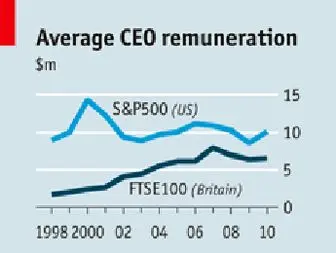
WHEN things went wrong for Middle Eastern tribes a couple of millennia ago, the accepted remedy was to send a sacrificial goat out into the wilderness to placate the gods. The practice continues today, but the voters have replaced the gods, and highly paid businesspeople the goats.
The growth of inequality all over the world encourages these rituals, and recent trends in remuneration certainly make bosses harder to sympathise with than goats. In Britain, where the latest bout of politicking about pay has broken out, chief executives can expect to receive average compensation in excess of £۴.۵m($۶.۹m) this year. Pay at the top grew by over ۳۰۰% between ۱۹۹۸ and ۲۰۱۰. At the same time, the median British worker ' s real wage has been pretty stagnant. These trends mean the ratio of executive to average pay at FTSE ۱۰۰ firms jumped from ۴۷ to ۱۲۰ times in ۱۲ years.
This is feeding the view that there is something wrong with British capitalism. Britain ' s political parties, although deeply divided on most economic policy, are competing for a middle ground which demands action on pay. The prime minister, David Cameron, thinks there is a “market failure”, and his coalition government wants to empower shareholders and staff to constrain pay at the top. Specific options include giving shareholders a binding veto on board pay, changing the make - up of pay committees and making compensation, including pay ratios, more transparent.
This remedy will be about as effective as the goat. Bosses ' pay has gone up not because corporate governance is failing but because of globalisation(see article). In the ۱۹۷۰s the FTSE ۱۰۰ was made up largely of parochial companies serving British customers. Now it is a global index of multinational companies operating in many different industries and countries. FTSE bosses are picked from a global pool. The skills they need, and the pay they receive, have changed.
Nor is it clear that British shareholders are weak. British corporate - governance rules, which allow shareholders to sack board members, are envied in America. At private firms, where owners are more directly in control, top pay is less visible, but has risen at similar rates. FTSE ۱۰۰ bosses are facing criticism not because their pay is the highest, but because it is the most transparent. Heads of legal and consultancy firms(which are not, by and large, public companies) are paid similar rates. British bosses are paid rather less than American ones and less too than the bosses of top European companies.
The long and the short of it
Giving more power to British shareholders is not a bad idea, but it will not make any difference. Getting and keeping a good boss matters more to a firm ' s owners than how much he or she is paid; and they invest internationally, so they know how much good bosses need to be paid. This looks more like a market rate than a market failure.
Mr Cameron should have focused on the weakest part of British pay: its emphasis on short - term performance. Tying bonuses to next year ' s earnings encourages scrimping on investment to buy back shares. Return - on - equity targets(until recently favoured by British banks) reward leverage, prioritising risky over risk - adjusted returns. A greater share of total pay in Britain should be tied to a firm ' s long - term performance, as it is in America. But if that happens, executives ' pay will probably go up further to compensate them for waiting for their cash.
Inequality is undoubtedly a serious political issue in the West. But governments that try to deal with the problem by passing the buck to companies will at best fail, and at worst harm the economy. Better sacrifice a goat.
















